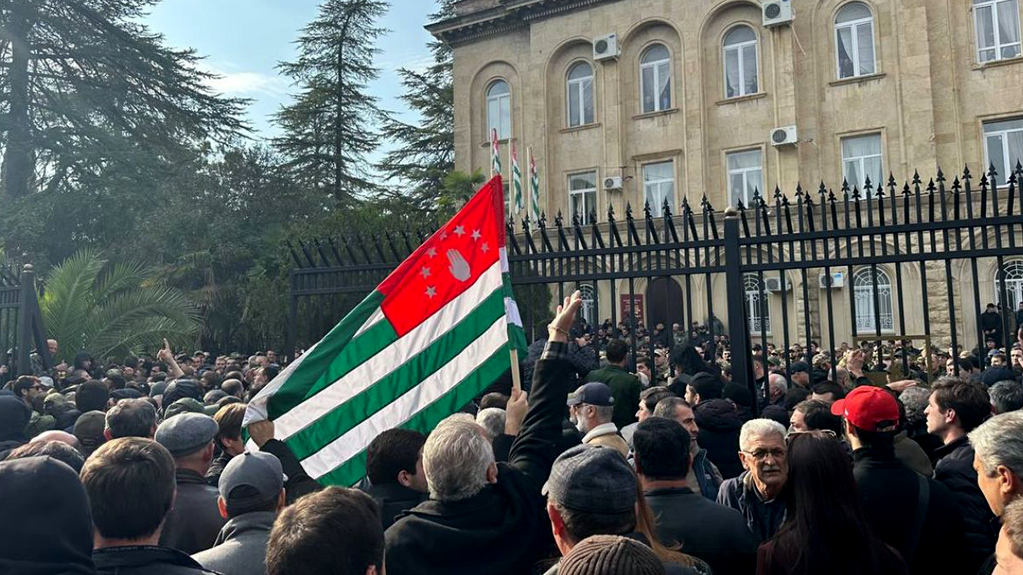Kan Tania, the Ambassador for Special Tasks at the Ministry of Foreign Affairs of occupied Abkhazia, stated that there are no anti-Russian sentiments in Abkhazia. He described claims to the contrary as "absurd" and argued that such speculations are intended to destabilize relations with Russia.
News
Trending stories
- 1 BBC investigation: WWI–Era Chemical Weapons Used to Disperse Tbilisi Protests
- 2 Starting in 2026, First-Year Students at Private Universities Will No Longer Receive State Grants
- 3 NGOs Demand Answers on Which Chemical Substances MIA Used Against Protesters
- 4 Kobakhidze and Putin Attend International Forum on Neutrality in Turkmenistan
- 5 Zurabishvili Appeals to International Organisations to Investigate Possible Use of “Camite”
- 6 The Strasbourg Court Has Begun the Substantive Hearing of Gela Mtivlishvili's Case
"There are no anti-Russian sentiments in Abkhazia, nor can there be. Even during the most challenging periods, such as the total humanitarian blockade of the 1990s, Abkhazia remained committed to the strategic course of cooperation with Russia.
No political force in Abkhazia, even hypothetically, could gain the support of the population if it pursued an anti-Russian agenda. Speculations on this topic are groundless and solely aim to destabilize our relations with Russia," said Kan Tania.
He listed several "facts" to underscore the "absurdity" of claims about anti-Russian sentiments in Abkhazia:
"Abkhazia made a significant contribution to the victory in the Great Patriotic War. A total of 55,500 people went to the front, 17 430 of whom did not return. Abkhazians ranked second in the Union in terms of the number of heroes and awards per capita. The title of Hero of the Soviet Union was awarded to 22 residents of Abkhazia. This demonstrates the deep commitment of the Abkhazian people to the common cause with Russia.
During the collapse of the Soviet Union - the so-called 'parade of sovereignties' - when many republics rushed to secede, Abkhazia instead supported the Union's preservation. This choice reaffirmed its strategic alignment with Russia.
During the Georgian aggression against Abkhazia, hundreds of volunteers from Russia came to our aid. After Abkhazia's victory, Russia became the first country to recognize its independence. This strengthened our fraternal ties and underscored the importance of our strategic alliance," said the representative of the so-called Ministry of Foreign Affairs.
Kan Tania further highlighted that the majority of Abkhazia's so-called citizens hold Russian citizenship, and Russian President Vladimir Putin received 94% support in Abkhazia during the 2024 presidential elections. "This reflects full support for the Russian president's course," Tania stated.
Last week, residents of occupied Abkhazia protested against the so-called investment agreement signed with Russia, resulting in the resignation of de facto President Aslan Bzhania. The "Investment Agreement," signed on October 30 in Moscow, grants benefits to Russian companies in Abkhazia. It was signed by Russian Minister of Economic Development Maxim Reshetnikov and de facto Vice Prime Minister and Minister of Economy of Abkhazia Kristina Ozgan. Opponents of the agreement argue that it is anti-national and places local companies at a disadvantage.
Earlier, public protests forced the de facto government, despite pressure from Russia, to withdraw a draft law from parliament. The law proposed the construction of apartments in Ochamchire, Tkvarcheli, and Gali on an area of 1,500,000 square meters.















